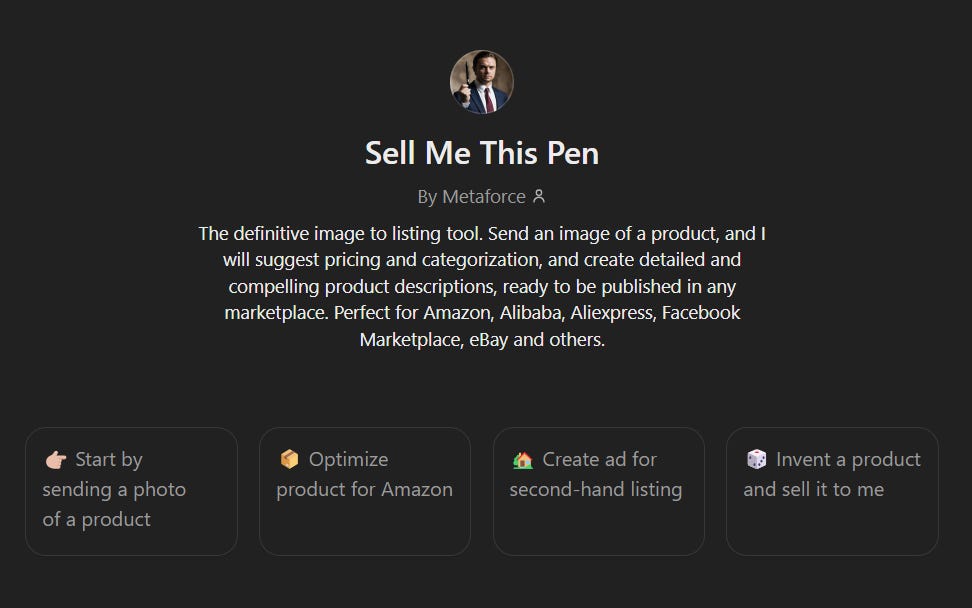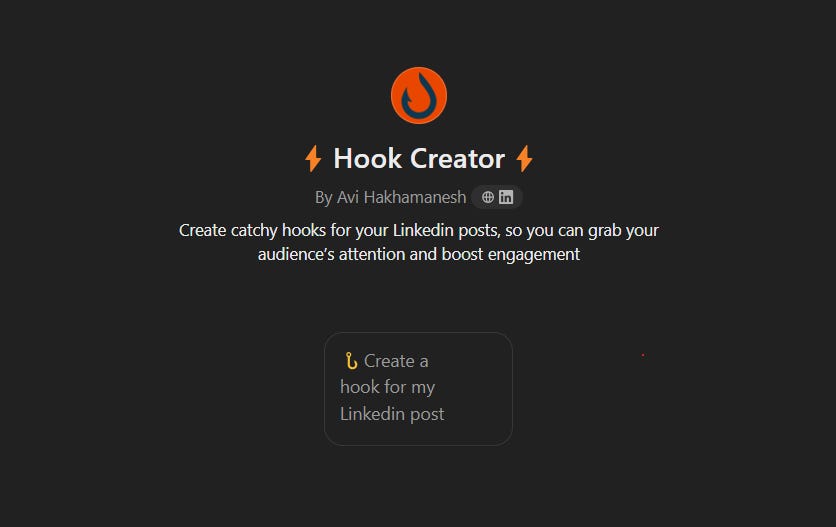Happy Friday!
Never heard of GPTs? You're not alone. They are customizable versions of ChatGPT designed to tackle specific tasks. In this edition, I’ll explain what GPTs are, why they’re so useful, and share a practical example.
But first, here’s what you need to know about AI this week (clickable links appear in orange in emails and underlined in the Substack app)::
ChatGPT's user base has doubled to 200 million weekly active users in a year, with 92% of Fortune 500 companies using OpenAI’s products.
While ChatGPT remains the leader in the generative AI space, the competition is intense, with companies like Microsoft, Google, Anthropic and Meta continuously updating their models to attract users.
Major tech companies like OpenAI, Microsoft, and Adobe support California’s AB 3211 bill, which would require them to label AI-generated content such as photos, videos, and audio clips.
Studies show women use ChatGPT 16-20% less than men even in the same roles, often due to lower confidence and a "good girl" mindset that discourages shortcuts. This reluctance may limit their future job prospects, as AI expertise is increasingly valued by hiring managers.
AI chatbots are helping Oklahoma City police create crime reports in seconds by analyzing body cam audio, which also captures officers' spoken observations during incidents. While the tech speeds up the reporting process, it also sparks concerns about errors and bias that could impact high stakes legal outcomes.
Critics, especially from marginalized communities, fear AI might reflect and even amplify inequalities in policing, raising questions about its broader impact on justice and public trust as the technology spreads.
Lionsgate pulled the trailer for "Megalopolis" after discovering it included fake AI-generated quotes from prominent film critics. The quotes, meant to highlight past criticism of Coppola’s work, were not properly vetted or fact-checked. The studio apologized for the error and dismissed the marketing consultant responsible.
This incident highlights the critical need for thorough AI training to ensure that users understand the tech’s current capabilities and limitations. While generative AI is a particularly powerful tool for marketing, improper use can lead to serious mistakes and significantly damage a brand's reputation. This kind of misuse also gives AI a bad rap.
Venezuelan journalists are using AI avatars to continue reporting while concealing their identities under President Maduro’s increasingly authoritarian regime.
The virtual journalists allow reporters to continue exposing the government’s crackdown on opposition which includes arrests, media suppression, and targeted violence against critics.
AI-generated porn is evolving rapidly, now capable of producing personalized hyper-realistic images and videos from simple text prompts. This hyper-customization is reshaping the industry by eliminating the need for human performers, creating a new genre of "ethical porn" where no real people are involved, addressing concerns about exploitation and consent. But this tech also blurs the lines between fantasy and reality, potentially distorting our expectations of sex and real-world relationships.
Google is rolling out custom AI chatbots called "Gems" for its paid Gemini Advanced subscribers and reinstated the ability for users to generate AI-created images of people, with new safeguards to prevent inappropriate or historically inaccurate content.
AI can dramatically enhance accessibility for people with disabilities by offering tools like automatic captions, research assistants, self-driving cars and voice-activated creativity platforms.
AI INSIGHTS
You Should be Playing with GPTs—For Work and Fun 🌟
But what are GPTs?
GPTs are customized versions of ChatGPT created for a specific - and generally more narrow - use-cases.
They're each focused on specific tasks like summarizing an article or report, creating a press release, brainstorming product or marketing ideas, creating e-mail subject lines, translating documents, creating images or diagrams, or serving as a negotiation or legal expert.
The GPT Store is OpenAI’s platform for distributing these custom GPTs. Think of it as an "App Store" for AI, where creators can publish their GPTs, and users can discover and use them – all for free.
Some apps are created by companies like Canva who can link ChatGPT to their existing service. Others are created by hobbyists or experts who create custom instructions (or prompts) for specific use cases, and upload additional knowledge to train the app to understand specific techniques, frameworks or examples.
Here’s what you’ll find:
Apps are organized by category: Writing, research and analysis, productivity, education, etc. You can also use the search bar to find the right one/s for your needs.
User-Friendly interface: Most GPTs are easy to use with a conversational interface. You can type in a question (or use your voice via the ChatGPT mobile app) about how the app works and what it can do.
Free to Try: The free tier offers plenty of opportunities to explore, with some limits on message counts.
Creating a GPT requires a paid subscription to the Plus ($20/month), Team, or Enterprise plans.
But now I want to show you one of my favorite GPTs in action.
Meet "Sell Me This Pen" - A GPT that helps you create and optimize product listings for various market places and even suggests pricing based on current market data.
You can also use it to edit and improve existing listings.
All you need to do is to upload a product image and some basic information to get started.
So, I uploaded an image of my “gently loved” floral silk sleeping mask and asked it to help me sell it (image of my actual conversation with the GPT ⬇️). Within Seconds, it:
Generated a catchy headline, a detailed description and a bulleted list of specifications.
Recommended a competitive price range of $10-$15 based on current market prices, making it a handy tool for Amazon, Facebook Marketplace, and E-bay listings.
This GPT is truly helpful if you’re looking to sell anything, especially on the second-hand market places.
Curious to try it out? You can find "Sell Me This Pen" using this link, or simply by searching for the it by name in the GPT Store. Just make sure the logo and description match the image I've shared above—several GPTs share similar names, so you'll want to ensure you’ve got the right one.
But why bother with GPTs when you can just prompt ChatGPT yourself?
1️⃣ Prompting Help: If you don’t yet have much experience in prompting AI, GPTs handle the basics for you. Most ask the right questions to get the job done.
2️⃣ Expertise Built-In: You can benefit from the knowledge and frameworks built into GPTs by domain experts—ideal for when you’re venturing into unfamiliar territory (like when I want to design a logo.)
⚠️ One caveat: The GPT Store is a bit like a flea market—full of hidden gems but also cluttered with mediocre options. It can take some time to find the best ones, but it’s worth the hunt. I wish I could tell you to look for GPTs with high user ratings or a large number of interactions to find the true gems, but in reality, some of the best GPTs are not yet reviewed, or have lower usage counts.
For repetitive tasks, I often create my own GPTs since the apps can be customized with your own context and data for more personalized and relevant responses. Doing this well can take a bit of training and practice, but isn’t hard to do – and will end up saving you tons of time and energy. If you want to learn more about prompting for GPTs, join my next workshop!
Here are a few of the GPTs I’ve created which you can use for free:
Email Marketing Expert GPT helps you write marketing, sales or event invite emails that get results. All you need to do is answer a few questions about your goal and audience and you’ll get a persuasive draft built on strong copywriting frameworks. You can tweak it until it’s just right.
Hook Creator GPT helps you create attention-grabbing and engaging “hooks” or openings for your LinkedIn posts to boost engagement - though I’ve found it works for other kinds of content (including social media posts and blogs) as well.
Give them a try and let me know what you think. I continue to refine them as I learn more and get feedback, so they can generate better results.
Have questions about GPTs? Hit reply and ask. If there’s enough interest, I’ll include the answers in future editions of the newsletter
That's all for this week.
I’ll see you next Friday. Thoughts, feedback and questions are welcome and much appreciated. Shoot me a note at avi@joinsavvyavi.com.
Stay curious,
Avi
💙💙💙 P.S. A huge thank you to my paid subscribers and those of you who share this newsletter with curious friends. It takes me about 6+ hours each week to curate, simplify the complex, and write this newsletter. So, your support means the world to me, as it helps me make this process sustainable.








